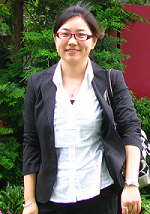Prof. Tu Liya
Position:
Lecturer, Institute of Curriculum and Instruction, Zhejiang University
PhD in Comparative Education, East China Normal University (2009)
Member of International Association for the Advancement of Curriculum Studies, IAACS09-2007~09-2008 Visiting Scholar, University of British Columbia, Centre for Curriculum Studies of Internationalization
Area of interest:
Her main areas of expertise are in curriculum policy and its operation, curriculum development and implementation, curriculum reform and school change, innovation of classroom teaching and learning. She is now hosting or engaging in several government sponsored or international cooperation research projects such as “Power ecology of curriculum policy change: international comparison and local experience”, and has published more than 20 papers in related area. She is also teaching undergraduate and graduate student courses such as “International curriculum policy research”, “curriculum reform research” at the university.
Universities’ Involvement in Local Educational Authorities’ Curriculum Capacity Building: Zhejiang University as an exemplar
Dr. Zhang Wenjun & Dr. Tu Liya
【Abstract】The New Curriculum in China empowers the local educational authorities on curriculum affairs, while in the meantime raises challenges to them.
The curriculum capacity building, which including the improvement of curriculum development and leadership of local educational authorities, of schools, and of school teachers; becomes one of the most important and challenging tasks for local educational authorities.
Universities and colleges as the institutions doing educational research, cultivating educators and providing social services, have advantages in studying new issues and proving ideal and consultancy from the frontier. Seeking cooperation with higher education sector becomes popular among local educational authorities for curriculum capacity building.
Using Zhejiang University as an exemplar, our presentation analyses the different aspects of enhancing higher education and local educational authority cooperation; which include top level design, international cooperation and communication, project leadership, teacher training, school curriculum development and supervision, publications and broadcasting.
The problems and difficulties are also explored, including the role of higher education sector, the cooperating orientation and agreement, the team building and accountability, the resources allocation, motivation, communication and cooperation mechanism, and the dilemma between the utilitarian pursuit and effectiveness of the cooperation.
【Key words】University, local educational authority, cooperation, curriculum capacity building.


